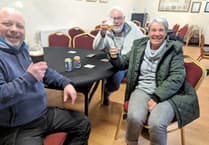A Pembrokeshire village has overcome the restrictions of the Covid lockdown to launch a film celebrating the river that defines it.
‘Born Of The Cleddau’ was filmed and edited in double quick time when the restrictions were eased in May, with the support of a grant from the Heritage Lottery Fund.
The money enabled members of the Llangwm Local History Society to hire a boat for a day as a filming platform and pay a handful of experts, but the script and the story line are based on research by long-time resident Graham Stephens and members of the society.
The film explores the links between the river and the village of Llangwm on its shores and is presented by Graham with the help of youngsters Sonny Zipperlen and Ela-Gwennon Jones.
But nothing was easy as lockdown forced filming to be shut down from November to early May and almost scuppered their plans.
Production manager Liz Rawlings, learning her trade under difficult circumstances, then had to cope with socially distanced presenters and difficult weather conditions.
“It was lucky that due to the size of the boat, social distancing could be adhered to, but the wearing of masks for filming was not feasible because it distorted words”, she said.
“We had to stick to a deadline but the weather was varied and gusts of wind added to the problems recording people’s voices.”
For Graham, who grew up on the banks of the Cleddau, a chance to record the stories and facts handed down from his father and grandfather was a wish come true.
“There was so much potential here it would be hard to know what to leave out!.” he said.
“Tales of the Garden Pit disaster and flying boats taking off over our house have always featured large in my upbringing.
“Every boating trip was made more interesting by references to the different place names along the waterway.
“And summer prawning expeditions to Lawrenny or up to Landshipping where the grown-ups would have a pint at ‘The Stanley’ sowed the seeds of a lifelong interest in boats and the river”.
As well as the Garden Pit mine disaster in which 40 men and boys died, the film tells the story of the row between rival ferry operators based on either side of the river, the press gangs who rounded up reluctant sailors to serve in the Royal Navy, and the voyage by Richard ll up the Cleddau in 1394 in the days when it was a major arterial waterway.
Music for the film was composed and performed by Mark Evans.
The film can be viewed on YouTube, using the link Born Of The Cleddau
The film-makers would like to thank Marcus Sulivan of Benton Castle for allowing them to film the privately-owned castle, woods and beach.




